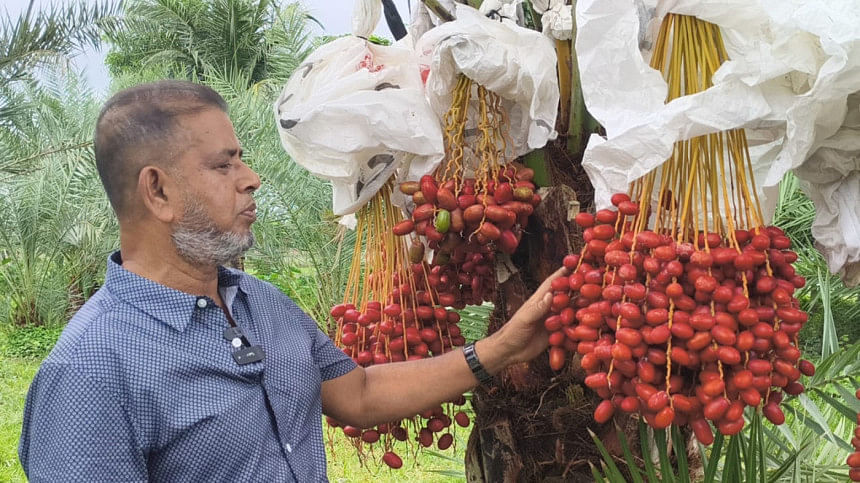Saudi dates flourish in coastal Bagerhat

Saudi dates -- native to desert climates -- are now thriving in the saline soil of Rampal upazila, Bagerhat, an area traditionally reliant on shrimp farming due to high salinity in its water bodies.
The transformation is led by Dihidar Zakir Hossain, an advocate from Sannyasi village under Mallikerber Union, who turned to farming in 2014. After repeated failures in shrimp and fruit cultivation, Zakir found hope in a YouTube video. "If dates can grow in deserts, why not here?" he asked himself, and planted the first seeds of change.
In 2019, he brought in 60 high-yield Saudi date saplings from northern Bangladesh, each costing Tk 40,000. Today, more than 70 trees are bearing fruit, with another 200 expected to produce within the year. His farm, spread over 15 acres, now holds over 250 date palms.
"Water management is the trickiest part," Zakir said. "Too little, they dry up; too much, they rot."
He said the challenge intensifies during the monsoon. "Rainwater often leads to fruit rot, so we need high-quality foreign cover sheets to protect the bunches. I also urged the government to import pest control medicine from Oman to treat infestation. Without proper remedies, entire harvests could be lost."
Shahidul Islam, a caretaker at the orchard, said people often visit the orchard and take photos.
Rafiqul Sheikh, a local farmer, said, "This success proves we can do more with our land. I'm planning to start my own date orchard with saplings from Zakir Bhai's nursery."
Zakir also grows Vietnamese coconut, malta, mango, and hog plum, and raises cattle. But the date farm is the cornerstone of his agricultural ambitions, with yields reaching a minimum of 10kg to a maximum of 40kg per tree.
He warned new farmers to avoid seed-grown plants, which often produce only male trees. "Use offshoots or grafted saplings," he advised. "It makes all the difference."
Md Motahar Hossain, deputy director of Bagerhat's Department of Agricultural Extension, said, "If this model proves scalable, it could transform saline agriculture in southern Bangladesh."

 For all latest news, follow The Daily Star's Google News channel.
For all latest news, follow The Daily Star's Google News channel. 



Comments